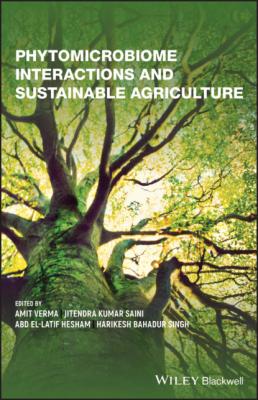Phytomicrobiome Interactions and Sustainable Agriculture. Группа авторов
Читать онлайн.| Название | Phytomicrobiome Interactions and Sustainable Agriculture |
|---|---|
| Автор произведения | Группа авторов |
| Жанр | Биология |
| Серия | |
| Издательство | Биология |
| Год выпуска | 0 |
| isbn | 9781119644828 |
23 Index
List of Tables
1 Chapter 1Table 1.1 Root exudation of different plants: biochemical nature of root exud...Table 1.2 Developments in root exudate studies and their action mechanism.
2 Chapter 2Table 2.1 Proteomic approaches available for detection of plant and microbes ...Table 2.2 Examples of phytomicrobiome interactions.
3 Chapter 3Table 3.1 Advance molecular techniques used for the characterization of vario...
4 Chapter 4Table 4.1 Role of phytomicrobiome in abiotic stresses studied recently.
5 Chapter 5Table 5.1 Major findings obtained from the study of the phyllomicrobiome of d...Table 5.2 Microbial diversity in the phyllosphere of various crop plants.
6 Chapter 6Table 6.1 Signaling molecules secreted by plants for establishing plant–micro...Table 6.2 Signaling molecules secreted by microbes for establishing plant‐mic...Table 6.3 Rhizobacteria used for alleviation of heavy metal stress in plants.
7 Chapter 7Table 7.1 List of microorganism forming biofilm and their mode of attachment.Table 7.2 List of endophytic bacterial mutant having genetic alteration and r...
8 Chapter 8Table 8.1 Composition of root exudates.Table 8.2 List of crop plants used in phytoremediation of heavy metals from s...Table 8.3 Potential microorganisms for biodegradation of different organic po...
9 Chapter 9Table 9.1 Various compounds in root exudates of different plant species.Table 9.2 Mechanisms of PGPR.Table 9.3 Nitrogen‐fixing bacteria with their relationship to host plants.
10 Chapter 10Table 10.1 Differences between organic and inorganic amendments.
11 Chapter 15Table 15.1 Phyllosphere microorganisms as biocontrol agents.Table 15.2 Plant–pathogen interaction by phyllosphere microorganisms.
List of Illustrations
1 Chapter 1Figure 1.1 Classification of root exudates compounds: various compounds are ...
2 Chapter 2Figure 2.1 A schematic flowchart of proteomic approaches for phytomicrobiome...
3 Chapter 3Figure 3.1 Metagenomic approach to reveal the structure and function of a pl...
4 Chapter 4Figure 4.1 Schematic diagram representing the interplay of phytomicrobiome a...
5 Chapter 5Figure 5.1 Different parts of phyllosphere and the multipartite interactions...Figure 5.2 Classification of root exudates compounds: various compounds are ...
6 Chapter 6Figure 6.1 Techniques used for rhizosphere engineering.Figure 6.2 Approaches to engineer rhizosphere for sustainable agriculture.
7 Chapter 7Figure 7.1 Phyto‐rhizospheric microbial interaction.Figure 7.2 Formation of biofilm at the root rhizosphere.Figure 7.3 Quorum sensing at the root rhizosphere.Figure 7.4 PGPR‐dependent nitrogen fixation.
8 Chapter 8Figure 8.1 Schematic diagram representing degradation of Inorganic and organ...
9 Chapter 9Figure 9.1 Overview of PGPR mechanisms. Sources: Pankaj et al. 2013; Bhatt a...
10 Chapter 10Figure 10.1 Physical, chemical, and biological indicators of soil quality. K...Figure 10.2 Permeability and water retention ability of different types of s...
11 Chapter 11Figure 11.1 Plant response to different forms of biotic and abiotic stresses...
12 Chapter 12Figure 12.1 Plant microbiota: promoting plant growth and health, suppressing...Figure 12.2 Role of endophytes in the process of phytoremediation: endophyte...
13 Chapter 13Figure 13.1 Schematic representation of central dogma with biological tasks....Figure 13.2 Structural organization of information extraction in bioinformat...Figure 13.3 Various tasks that can be done through bioinformatics in microbi...
14 Chapter 14Figure 14.1 Role of zinc in plants. Figure 14.2 Causes of zinc deficiency in crops.
15 Chapter 15Figure 15.1 The significance of phyllosphere microbiota in agriculture.Figure 15.2 Importance of phyllosphere microbiota.Figure 15.3 Frost injury on leaf surface due to ice nucleation activity.
Guide
2 Phytomicrobiome Interactions and Sustainable Agriculture
6 Preface
10 Index
11 WILEY END USER LICENSE AGREEMENT
Pages
1 iii
2 iv
3 v
4 xii
5 xiii
6 xiv
7 xv
8 xvi
